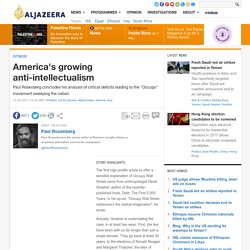

An interview with Julian Assange - Canadian Charger. Assange sits on a tattered couch, wearing a wool sweater, dark pants and an electronic manacle around his right ankle, visible only when he crosses his legs. At 40, the WikiLeaks founder comes across more like an embattled rebel commander than a hacker or journalist.
He's become better at handling the media - more willing to answer questions than he used to be, less likely to storm off during interviews - but the protracted legal battle has left him isolated, broke and vulnerable. Assange recently spoke to someone he calls a Western "intelligence source," and he asked the official about his fate. Will he ever be a free man again, allowed to return to his native Australia, to come and go as he pleases? Prof Ian Goldin Discusses The Future, Oxford Martin School. Bill Moyers keynote at Public Citizen's 40th Anniversary Gala.
America's growing anti-intellectualism. Story highlights The first high-profile article to offer a sensible explanation of Occupy Wall Street came from anthropologist David Graeber, author of the recently-published book, Debt: The First 5,000 Years.

In his op-ed, "Occupy Wall Street rediscovers the radical imagination", he wrote: Actually, Graeber is understating the case, in at least two ways. First, the lies have been with us far longer than just a single decade.